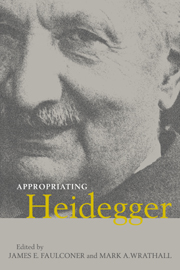Appropriating Heidegger
Although Martin Heidegger is undeniably one of the most influential philosophers of the twentieth century, among the philosophers who study his work we find considerable disagreement over what might seem to be basic issues: why is Heidegger important? What did his work do? This volume is an explicit response to these differences, and is unique in bringing together representatives of many different approaches to Heidegger's philosophy. Topics covered include Heidegger's place in the 'history of being', Heidegger and ethics, Heidegger and theology, and Heidegger and Nazi concepts of race. More generally, the contributors also address their respective visions of the nature of philosophy and the presuppositions which guide their understanding of Heidegger.
- Great interest in Heidegger as one of the most influential twentieth century philosophers
- The volume brings together representatives of conflicting strands of Heidegger studies
- Several big names among the contributors, including Cavell, Dreyfus and Critchley
Product details
August 2008Adobe eBook Reader
9780511410994
0 pages
0kg
This ISBN is for an eBook version which is distributed on our behalf by a third party.
Table of Contents
- 1. Appropriating Heidegger James E. Faulconer
- Part I. Thinking Our Age:
- 2. Philosophy, thinkers, and Heidegger's place in the history of being Mark A. Wrathall
- 3. Night and day: Heidegger and Thoreau Stanley Cavell
- 4. Heidegger's alleged challenge to the Nazi concepts of race Robert Bernasconi
- 5. Heidegger and ethics beyond the call of duty Albert Borgmann
- Part II. Heidegger in Context:
- 6. People of God, people of being: the theological presuppositions of Heidegger's path of thought John D. Caputo
- 7. Heidegger for beginners Simon Critchley
- 8. The critique of anthropologism in Heidegger's thought Françoise Dastur
- Part III. Reading Being and Time:
- 9. In respectful contempt: Heidegger, appropriation, facticity Rudi Visker
- 10. Could anything be more intelligible than everyday intelligibility: reinterpreting Division I of Being and Time in the light of Division II Hubert L. Dreyfus
- 11. Another time John Sallis
- 12. Intentionality, teleology, and normativity Mark Okrent.




